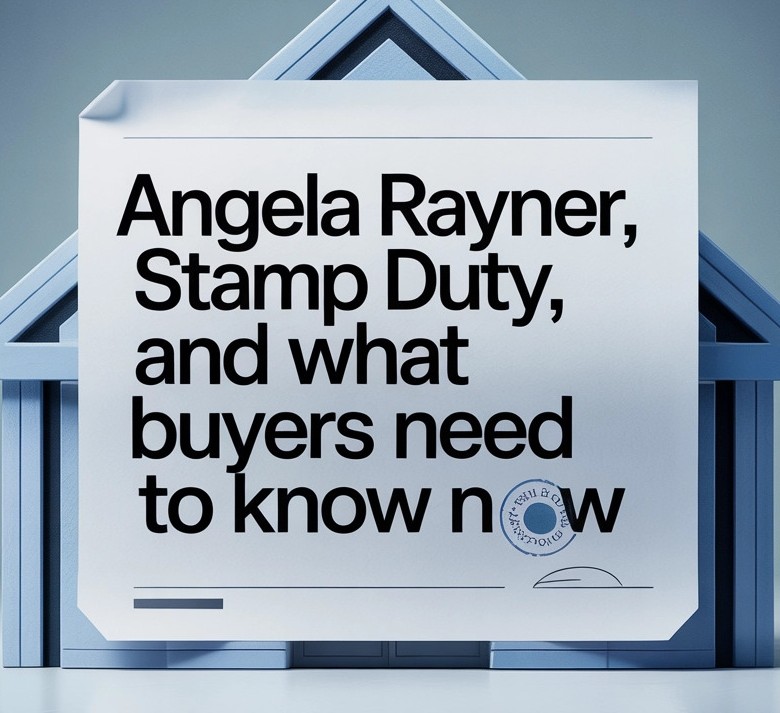Angela Rayner’s recent stamp duty blunder has sent shockwaves through Westminster – and it should be a wake-up call for anyone buying property. The Deputy Prime Minister and Housing Secretary admitted she underpaid stamp duty by a whopping £40,000 on her £800,000 Hove flat, claiming she was “wrongly advised” about her tax obligations.
But here’s the thing: if the person responsible for housing policy can get caught out by stamp duty rules, what chance do the rest of us have? Rayner’s mistake isn’t just political drama – it’s a stark reminder of how complex property taxes can be and why getting the right advice matters more than ever.
What Went Wrong for Angela Rayner?
The details of Rayner’s case read like a cautionary tale. She should have paid £70,000 in stamp duty when buying her Hove property, but only coughed up £30,000. The missing £40,000 relates to the second-home stamp duty surcharge – that additional 3% hit that applies when you already own another property.
But Rayner’s situation wasn’t straightforward. In 2020, her son (who has lifelong disabilities) received a financial settlement following complications from his premature birth. A trust was set up to manage this money, and Rayner committed to transferring her interest in the family home in Ashton-under-Lyne to this trust, with her son as the sole beneficiary.

After her 2023 divorce, things got even more complicated. A “nesting” arrangement was established where the children stayed in the family home while the divorced parents took turns moving in and out to care for them. Try explaining that ownership structure to your conveyancer at 4pm on a Friday.
This complex web of trusts, shared ownership, and family arrangements created a stamp duty minefield. And somewhere in this complexity, the advice went wrong.
The Professional Advice Problem
Here’s where things get really interesting – and worrying for the rest of us. Rayner claims she was “wrongly advised about her tax exposure” by professionals. But the conveyancing firm involved, Verrico & Associates, has denied providing her with tax advice, contradicting earlier claims that she’d received guidance from “a conveyancer and two experts in trust law.”
So who advised her? And did they have the full picture of her complex circumstances? These questions are now at the heart of an investigation by Sir Laurie Magnus, the independent adviser on ministerial standards.
For property buyers, this confusion highlights a crucial point: not all professional advice is created equal. Your high street solicitor might be brilliant at straightforward conveyancing but lack the specialist tax knowledge needed for complex scenarios.
Current Stamp Duty Rules – What You Need to Know
While Rayner’s controversy doesn’t change current stamp duty rules, it’s worth understanding what you’re dealing with. The rates for England and Northern Ireland are:
Standard Rates:
- 0% on properties up to £250,000
- 5% on the portion from £250,001 to £925,000
- 10% on the portion from £925,001 to £1.5 million
- 12% on anything above £1.5 million
First-time buyers get relief:
- 0% on properties up to £425,000
- 5% on the portion from £425,001 to £625,000
- Then standard rates apply
Second-home surcharge:
Add 3% to each band if you’re buying an additional property

The devil, as Rayner discovered, is in the detail. When does the second-home surcharge apply? What counts as “owning another property” if it’s held in trust? What if you’re in the process of selling your existing home? These aren’t just academic questions – get them wrong and you could face a nasty tax bill.
Red Flags That Should Make You Seek Specialist Advice
Rayner’s case provides a masterclass in when standard conveyancing advice isn’t enough. If any of these apply to you, you need specialist tax guidance:
Complex ownership structures: Properties held in trust, shared ownership, or unusual family arrangements
Multiple properties: Even if you’re planning to sell your existing home
Previous property transactions: Still own a share in a property you thought you’d left behind?
Divorce or separation: Shared custody arrangements or “nesting” setups
Business connections: Company ownership of properties or mixed-use buildings
The cost of specialist advice might seem steep, but it’s nothing compared to a £40,000 underpayment that comes back to bite you.
Why This Matters for Auction Buyers
At Palace Auctions, we see buyers from all walks of life, each with their own unique circumstances. Property auctions can involve some complex scenarios – distressed sales, unusual properties, tight completion deadlines. In this environment, getting your stamp duty calculations right from the start is crucial.

Auction purchases typically require completion within 28 days of the hammer falling. That’s not much time to discover you’ve miscalculated your stamp duty liability. We always recommend buyers get their financing and tax obligations sorted before bidding day, not after.
The Bigger Picture: Rayner’s Housing Ambitions
Beyond the stamp duty drama, it’s worth remembering Rayner’s broader housing agenda. She’s committed to delivering 1.5 million new homes over the next five years – a target that would significantly boost housing supply if achieved. Her experience with stamp duty complexity might actually inform future policy discussions about simplifying the system.
For buyers, this potential increase in housing supply could mean more choice and potentially more stable prices. But it also means more transactions going through the stamp duty system, making it even more important that the rules are clear and consistently applied.
Practical Takeaways for Property Buyers
Get advice in writing: Make sure any tax guidance is documented. Verbal advice is harder to verify later.
Use specialists for complex cases: If your situation involves trusts, multiple properties, or unusual ownership structures, standard conveyancing might not be enough.
Disclose everything: Your adviser can only help if they know the full picture. Don’t assume details aren’t relevant.
Double-check surcharge eligibility: The 3% additional rate catches many buyers off guard. Make sure you understand whether it applies to you.
Factor in all costs early: Stamp duty should be part of your budget calculations from day one, not a last-minute surprise.

The Professional Advice Minefield
Rayner’s case exposes a fundamental problem in property transactions: the difference between legal advice and tax advice. A conveyancer handles the legal transfer of property but may not be qualified to give complex tax guidance. A tax advisor understands HMRC rules but might not grasp all the legal nuances of property ownership.
In complex cases, you might need both – and you need to make sure they’re talking to each other. The cost of this joined-up professional advice is an investment in avoiding much larger problems down the line.
What Happens Next?
Rayner has referred herself to the ministerial standards watchdog and contacted HMRC to arrange payment of the additional tax. Her political future may hang on the investigation’s findings, but for the rest of us, her case serves as a valuable lesson in the importance of getting stamp duty right.
The controversy might also prompt a broader review of stamp duty rules. Chancellor Rachel Reeves is already under pressure to simplify the system, and high-profile cases like this add to calls for reform.
Final Thoughts
Angela Rayner’s stamp duty saga isn’t just Westminster gossip – it’s a real-world reminder of how complex property taxes can be. If the Housing Secretary can get caught out despite having access to government resources and professional advisors, anyone can.
The lesson isn’t that the system is broken (though it might be overly complex). It’s that property transactions involving anything more complicated than a straightforward first-time purchase require specialist advice from day one.
At Palace Auctions, we see buyers navigate these complexities successfully every day. The ones who do it right are those who get their advice early, from the right professionals, and with full disclosure of their circumstances. Don’t let stamp duty complications derail your property ambitions – get the right guidance and get it early.
Whether you’re bidding at auction or buying through traditional channels, make sure you understand your stamp duty obligations before you commit. Your bank account will thank you for it.
….


